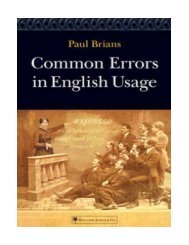url?sa=t&source=web&cd=3&ved=0CC0QFjAC&url=http://www.teachingenglish.org.uk/sites/teacheng/files/B369-Young-Learners-Activity-Book_v10
url?sa=t&source=web&cd=3&ved=0CC0QFjAC&url=http://www.teachingenglish.org.uk/sites/teacheng/files/B369-Young-Learners-Activity-Book_v10
url?sa=t&source=web&cd=3&ved=0CC0QFjAC&url=http://www.teachingenglish.org.uk/sites/teacheng/files/B369-Young-Learners-Activity-Book_v10
You also want an ePaper? Increase the reach of your titles
YUMPU automatically turns print PDFs into web optimized ePapers that Google loves.
TeachingEnglish <strong>Young</strong> <strong>Learners</strong> <strong>Activity</strong> <strong>Book</strong><br />
Activities<br />
5. Those children who finish quickly can start to write their own sentences with hidden animals<br />
in them that they can then share when everyone has finished.<br />
Notes<br />
Do not worry if the sentences contain unknown vocabulary. It is good for the children to be<br />
exposed to language they do not know and learn that it is not always necessary to understand<br />
everything to achieve the goal. If children want a translation of the sentences, try waiting until<br />
after they have found the animal names to do this so that they do not get distracted from the<br />
main activity.<br />
You may prefer to avoid ‘hiding’ words using capital letters in the sentence if you think it might<br />
confuse the children.<br />
You might want to provide children with lower English levels with a list of the animals they<br />
have to find.<br />
Alternatives<br />
• You can use this activity to revise any set of vocabulary, such as colours, clothes, furniture,<br />
parts of the body and so on.<br />
• You can extend the activity by asking the children to draw the animals and label them.<br />
• If the children’s level of English is sufficient, you can extend the activity by asking them to tell<br />
an animal story, either invented or based on their experience. They can then write the story<br />
and illustrate it themselves.<br />
• Children like puzzles. You can use the website http://puzzle-maker.com/WS/index.htm to make<br />
free crossword puzzles and word searches based on your own vocabulary lists and definitions<br />
(thank you to teachers at the JALT Conference for this suggestion).<br />
No resources?<br />
You only need a blackboard and chalk for this activity.<br />
© British Council 2012<br />
41





